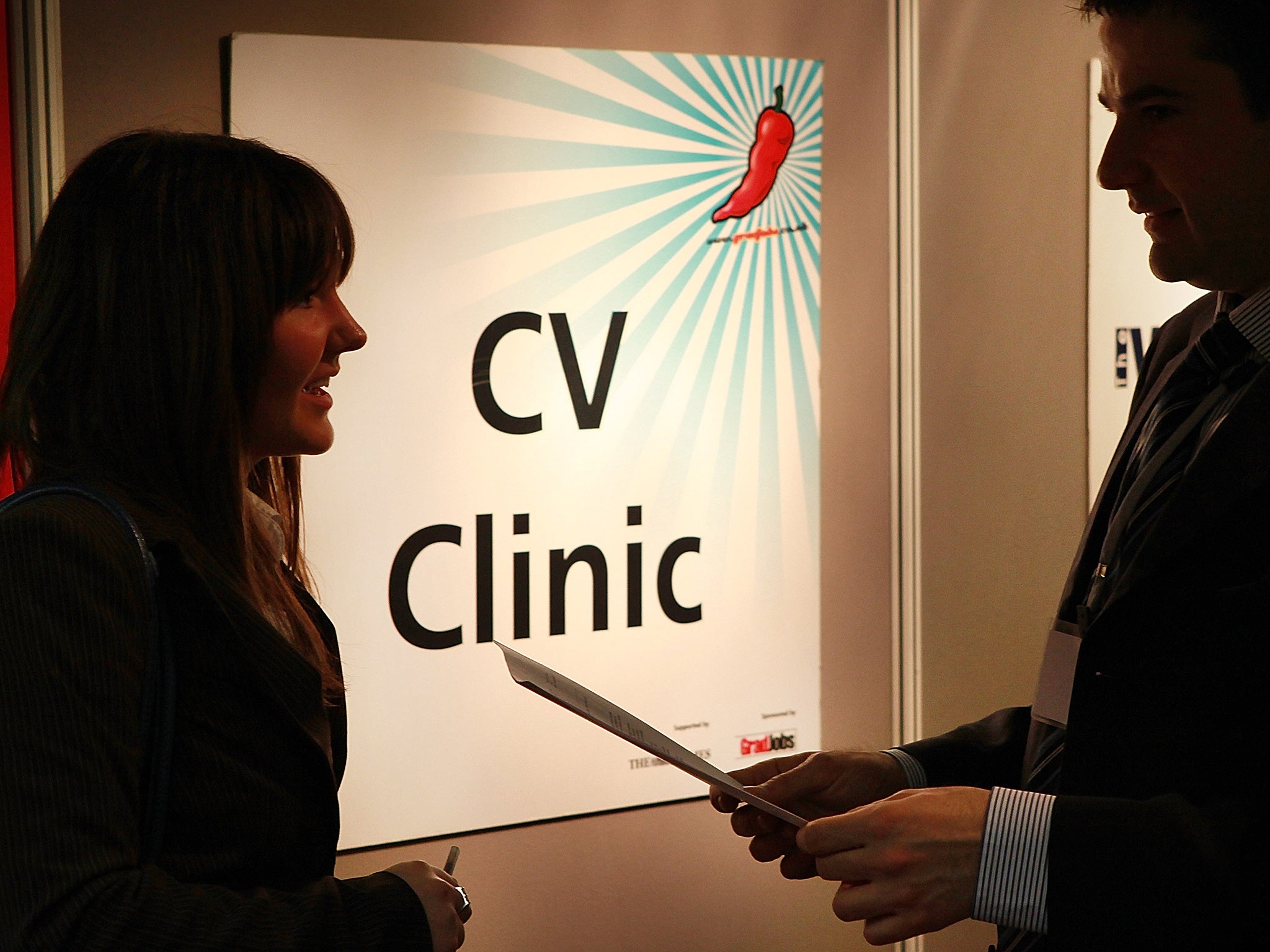25 CV mistakes you need to fix right now
If your résumé has just one typo, if it's formatted poorly, or you use the wrong font, it could easily end up in the 'no' pile

Your support helps us to tell the story
From reproductive rights to climate change to Big Tech, The Independent is on the ground when the story is developing. Whether it's investigating the financials of Elon Musk's pro-Trump PAC or producing our latest documentary, 'The A Word', which shines a light on the American women fighting for reproductive rights, we know how important it is to parse out the facts from the messaging.
At such a critical moment in US history, we need reporters on the ground. Your donation allows us to keep sending journalists to speak to both sides of the story.
The Independent is trusted by Americans across the entire political spectrum. And unlike many other quality news outlets, we choose not to lock Americans out of our reporting and analysis with paywalls. We believe quality journalism should be available to everyone, paid for by those who can afford it.
Your support makes all the difference.Hiring managers receive dozens — sometimes hundreds — of CVs and résumés for any given opening.
They don't have the time or resources to review each one closely, so they spend approximately six seconds on their initial “fit/no fit” decision.
You may be perfect for the job, but if your résumé has just one typo, if it's formatted poorly, or you use the wrong font, it could easily end up in the “no” pile.
1. An objective.
If you applied, it's already obvious you want the job.
The exception: If you're in a unique situation, such as changing industries completely, it may be useful to include a brief summary.
2. Irrelevant work experiences.

Yes, you might have been the “king of making milkshakes” at the restaurant you worked for in high school. But unless you are planning on redeeming that title, it is time to get rid of all that clutter.
As Alyssa Gelbard, career expert and founder of career-consulting firm Résumé Strategists, points out, however, past work experience that might not appear to be directly relevant to the job at hand might show another dimension, depth, ability, or skill that actually is relevant or applicable.
Only include this experience if it really showcases additional skills that can translate to the position you're applying for.
3. Personal stuff.
Don't include your marital status, religious preference, or social-security number.
This might have been the standard in the past, but all of this information is now illegal for your employer to ask from you; so there's no need to include it.
4. Your hobbies.

Nobody cares.
If it's not relevant to the job you're applying for, it's a waste of space and a waste of the company's time.
5. Your age.
If you don't want to be discriminated against for a position because of your age, it's time to remove your graduation date, says Catherine Jewell, author of “New Résumé, New Career.”
Another surprising way your resume could give away your age: double spaces after a period.
6. Too much text.
When you use a .5 inch margin and eight-point font in an effort to get everything to fit on one page, this is an “epic fail,” says J.T. O'Donnell, a career and workplace expert, founder of career-advice site Careerealism.com, and author of “Careerealism: The Smart Approach to a Satisfying Career.”
She recommends lots of white space and no more than a .8 margin.
7. Time off.

If you took time off to travel or raise a family, Gelbard doesn't recommend including that information on your résumé. “In some countries, it is acceptable to include this information, especially travel, but it is not appropriate to include that in the body of a résumé in the US.”
8. References.
If your employers want to speak to your references, they'll ask you. Also, it's better if you have a chance to tell your references ahead of time that a future employer might be calling.
If you write “references upon request” at the bottom of your résumé, you're merely wasting a valuable line, career coach Eli Amdur says.
9. Personal pronouns.
Your résumé shouldn't include the words “I,” “me,” “she,” or “my,” says Tina Nicolai, executive career coach and founder of Resume Writers' Ink.
“Don't write your résumé in the third or first person. It's understood that everything on your resume is about you and your experiences.”
10. Present tense for a past job.

Never describe past work experience using the present tense. Only your current job should be written in the present tense, Gelbard says.
11. A less-than-professional email address.
If you still use an old email address, like BeerLover123@gmail.com or CuteChick4life@yahoo.com, it's time to pick a new one.
It only takes a minute or two, and it's free.
12. Any unnecessary, obvious words, like, “Phone.”
Amdur says there is no reason to put the word “phone” in front of the actual number.
“It's pretty silly. They know it's your phone number.” The same rule applies to email.
13. Your current business-contact info.

This is not only dangerous; it's stupid. Do you really want employers calling you at work? How are you going to handle that? Oh, and by the way, your current employer can monitor your emails and phone calls. So if you're not in the mood to get fired, or potentially charged with theft of services (really), then leave the business info off.
14. Your boss' name.
Don't include your boss' name on your résumé unless you're OK with your potential employer contacting him or her. Even then, Gelbard says the only reason your boss' name should be on your résumé is if the person is someone noteworthy, and if it would be really impressive.
15. Company-specific jargon.
“Companies often have their own internal names for things like customised software, technologies, and processes that are only known within that organisation and not by those who work outside of it,” Gelbard says. “Be sure to exclude terms on your résumé that are known only to one specific organisation.”
16. Social-media URLs that are not related to the targeted position.

Links to your opinionated blogs, Pinterest page, or Instagram account have no business taking up prime résumé real estate. “Candidates who tend to think their personal social media sites are valuable are putting themselves at risk of landing in the 'no' pile,” Nicolai says.
17. Salary information.
“Some people include past hourly rates for jobs they held in college,” Nicolai says. This information is completely unnecessary and may send the wrong message.
Amy Hoover, president of Talent Zoo, says you also shouldn't address your desired salary in a résumé. “This document is intended to showcase your professional experience and skills. Salary comes later in the interview process.”
“But you should list relevant URLs, such as your LinkedIn page or any others that are professional and directly related to the position you are trying to acquire,” she says.
18. Outdated fonts.

“Don't use Times New Roman and serif fonts, as they're outdated and old-fashioned,” Hoover says. “Use a standard, sans-serif font like Arial.”
Also, be aware of the font size, she says. Your goal should be to make it look nice and sleek — but also easy to read.
19. Fancy fonts.
Curly-tailed fonts are also a turn off according to O'Donnell. “People try to make their résumé look classier with a fancy font, but studies show they are harder to read and the recruiter absorbs less about you.”
20. Annoying buzzwords.
CareerBuilder asked 2,201 US hiring managers: “What résumé terms are the biggest turnoffs?” They cited words and phrases such as, “best of breed,” “go-getter,” “think outside the box,” “synergy,” and “people pleaser.”
Terms employers do like to see on résumés include: “achieved,” “managed,” “resolved,” and “launched” — but only if they're used in moderation.
21. Reasons you left a company or position.

Candidates often think, “If I explain why I left the position on my résumé, maybe my chances will improve.”
“Wrong,” Nicolai says. “Listing why you left is irrelevant on your résumé. It's not the time or place to bring up transitions from one company to the next.”
Use your interview to address this.
22. Your GPA.
Once you're out of school, your grades aren't so relevant.
If you're a new college graduate and your GPA was a 3.8 or higher — it's OK to leave it. But, if you're more than three years out of school, or if your GPA was lower than a 3.8, ditch it.
23. A photo of yourself.

This may become the norm at some point in the future, but it's just weird (and tacky and distracting) for now.
24. Opinions, not facts.
Don't try to sell yourself by using all sorts of subjective words to describe yourself, O'Donnell says. “I'm an excellent communicator” or “highly organised and motivated” are opinions of yourself and not necessarily the truth. “Recruiters want facts only. They'll decide if you are those things after they meet you,” she says.
25. Short-term employment.
Avoid including a job on your resume if you only held the position for a very short period of time, Gelbard says. You should especially avoid including jobs you were let go from or didn't like.
Vivian Giang contributed to an earlier version of this article.
Read more:
• Goldman Sachs rethinks its stock market outlook because of something that hasn't happened in at least 48 years
• The curious case of why the head of Britain's finance regulator suddenly doesn't want the job anymore
• There's even more evidence the iPhone 7 will be waterproof and kill the headphone jack
Read the original article on Business Insider UK. © 2015. Follow Business Insider UK on Twitter.
Join our commenting forum
Join thought-provoking conversations, follow other Independent readers and see their replies
Comments